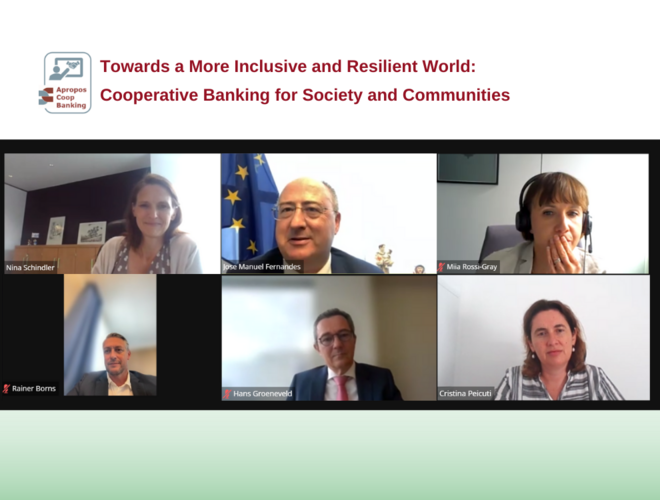Brussels, 29 June 2023 – The 23rd edition of the Apropos Coop Banking event of the European Association of Co-operative Banks (EACB) focused on the societal impact of cooperative banking to members, clients, and society at large. The webinar featured a presentation of a study on the benefits of cooperative banking, followed by a discussion with distinguished panellists José Manuel Fernandes, Member of the European Parliament, Miia Rossi-Gray, Policy Officer at the European Commission, Rainer Borns, Chief Financial Officer at Volksbank Wien, Hans Groeneveld, Director International Cooperative Affairs at Rabobank and Professor at Tilburg University, and Cristina Peicuti, Economist at BCPE Group and Professor at ESCP Business School.
Organised on the margins of the 2023 International Day of Cooperatives themed "Cooperatives: partners for accelerated sustainable development" on 1 July, the event’s goal was to substantiate the societal impact of cooperative banks, emphasising their benefits to regions and communities.
Based on findings of a focused survey among EACB members, Prof. Hans Groeneveld shed light in the study on how “European cooperative banks do not only grant (in)direct cooperative benefits to individual members but also aspire to contribute to the development of members’ living environment and to addressing (inter)national issues with a large impact on society. These benefits have been substantiated by real examples such as fulfilling a social network function for small businesses, sponsoring of local sport and cultural activities, and consulting and collaborating with local governments and/or organisations”.
The motto "Social impact of cooperative banks – how do cooperative banks contribute towards a more inclusive and resilient world?" provided the frame for an in-depth panel discussion further elaborating on the benefits offered by cooperatives, with a particular emphasis on their societal impact and the regulatory landscape.
From a political standpoint, MEP Fernandes underscored the need for “Differentiated and fair rules for the European cooperative banking sector” to propel their role supporting the transition to a more sustainable and social economy. In this context, Miia Rossi-Gray drew attention to the European Commission’s policy efforts supporting social enterprises like cooperative banks in the new social economy framework, and providing guidance for measurement of social impact foreseen in the next year.
Moderating discussions, Nina Schindler, EACB CEO, drew her key takeaways from the debate: “The sustainable development of society and communities have long laid at the beating-heart of cooperative bank’s identity. As citizens nowadays expect greater social impact from enterprises, cooperative banks have been reassured of their mission to put people first, contributing to societal welfare in their respective regions and communities. Although the discussion has demonstrated an affirming commitment to make space for diversity within the banking sector, there is a need to further enhance decision-makers' recognition of the distinctive impact values of cooperative banks for the economy as a whole and society at large, by concise communication underpinned with vivid proof-points. To allow cooperative banks to effectively act as drivers of social impact, an adequate regulatory setting with limited bureaucracy would be a pre-requisite.”



